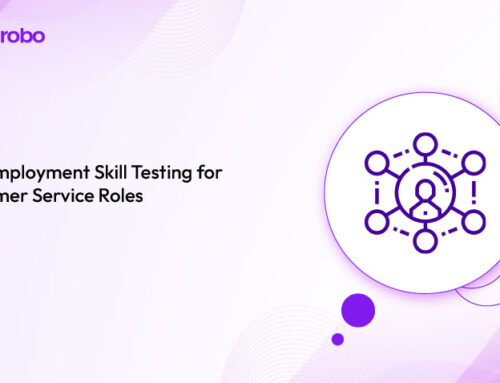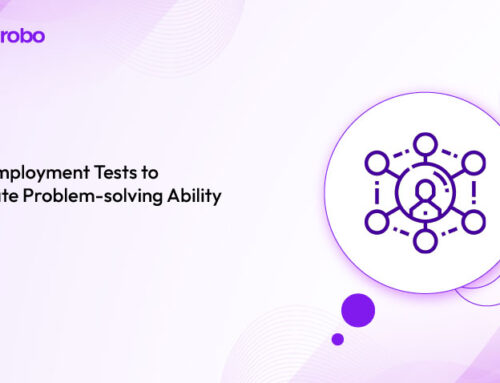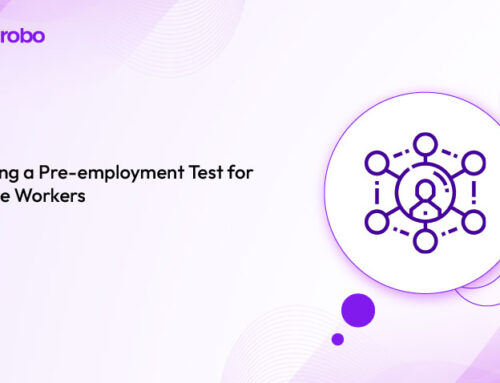
Key Takeaways
-
Customer Success Managers (CSMs) drive retention, revenue growth, and loyalty by ensuring customers achieve lasting value and strengthening customer relationships.
-
Core skills such as communication, empathy, problem-solving, technical aptitude, and adaptability enable CSMs to proactively meet evolving customer needs.
-
Emerging skills like data literacy, proactive monitoring, and business acumen are increasingly essential as customer expectations and digital engagement continue to rise.
-
Skillrobo’s customizable assessments help businesses identify and hire top CSM talent through structured, competency-based evaluations, leading to stronger teams and long-term growth.
The Evolving Role of Customer Success Managers (CSMs) in Modern Businesses
Customer Success Managers (CSMs) play a pivotal role in subscription-driven and service-based businesses. They are responsible for ensuring that customers achieve measurable value from the products or services they adopt, which directly drives renewals, account expansions, and brand advocacy.
Customer expectations are higher than ever. According to a survey by PwC, 32% of customers would leave a brand they love after just one bad experience. This rising expectation places enormous pressure on businesses to deliver consistent, high-quality customer experiences across every touchpoint.
Companies that invest in building strong, skilled CSM teams not only improve customer satisfaction but also retain more clients, maximize customer lifetime value, and unlock new growth opportunities through upsells and referrals. CSMs have transitioned from being reactive support agents to proactive business advisors, making their role more critical than ever.
However, finding and hiring the right CSMs remains a significant challenge. Traditional resumes and unstructured interviews often fail to capture the interpersonal, technical, and strategic skills that distinguish exceptional CSMs from average ones. Organizations need more structured, skills-based approaches to identify and onboard top customer success talent.
Core Skills for Customer Success Managers
Customer Success Managers (CSMs) are the frontline of customer experience. They not only resolve issues but also actively drive customer loyalty, retention, and growth. To excel in this pivotal role, CSMs must master a combination of interpersonal, technical, and strategic skills.
Below are the core skills every CSM needs to thrive:
1. Active Listening and Communication
A great CSM must understand customer goals, challenges, and feedback without making assumptions. Active listening is key — it means truly hearing what customers are saying (and what they’re not saying), asking clarifying questions, and confirming understanding.
Strong communication skills ensure that:
-
Expectations are set from the beginning
-
Issues are resolved transparently and promptly
-
Trusting, lasting relationships are built with customers
For example, during onboarding, a CSM who practices active listening can tailor implementation workflows to the client’s unique processes, which improves satisfaction, speeds adoption, and strengthens retention from day one.
2. Empathy and Customer-Centric Thinking
Empathy enables CSMs to see situations from the customer’s perspective. It’s not just about being kind — it’s about emotionally connecting with customers and aligning support with their business goals.
Empathetic CSMs are more likely to:
-
Anticipate unspoken or emerging needs
-
Deliver highly personalized support experiences
-
Build emotional loyalty that leads to renewals and advocacy
During hiring, assessing a candidate’s ability to identify personality traits can provide early insights into their capacity for empathy and customer-centric thinking.
3. Problem-Solving and Critical Thinking
CSMs are often the first point of contact when a customer faces an issue. Problem-solving and critical thinking skills are essential for diagnosing root causes accurately, collaborating with internal teams, and providing effective solutions, often under time pressure.
Skilled problem-solvers:
-
Analyze issues logically rather than react emotionally
-
Offer creative, proactive workarounds
-
Minimize escalations to technical support or management
Instead of passing every customer problem upstream, a skilled CSM can quickly suggest viable alternatives, reducing customer frustration and strengthening loyalty.
4. Technical Aptitude
In today’s SaaS-driven environment, CSMs don’t need to be engineers, but they must have strong technical aptitude. Understanding product configurations, integrations, APIs, and platform workflows is critical for helping customers get maximum value.
Technically proficient CSMs can:
-
Support customers effectively during onboarding and beyond
-
Troubleshoot basic technical issues without delay
-
Drive feature adoption by educating users on underutilized capabilities
Companies can use online examination software systems to assess technical aptitude during the hiring process, ensuring new hires can keep up with the pace of customer demands.
5. Relationship Management
Customer success isn’t just about solving problems — it’s about building long-term relationships that create trust and mutual growth.
Strong relationship management includes:
-
Regular, value-driven check-ins to stay top-of-mind
-
Executive business reviews (EBRs) to align with leadership stakeholders
-
Celebrating customer milestones, like renewals or product expansions
By nurturing relationships proactively, CSMs transform satisfied customers into brand advocates, fueling referrals, upsells, and positive testimonials that amplify the company’s reputation.
6. Adaptability
Customer needs, technologies, and markets are changing faster than ever. Adaptable CSMs embrace change, stay curious, and adjust their strategies as necessary to stay relevant and effective.
Adaptability ensures that CSMs can:
-
Pivot quickly when product features evolve
-
Respond to shifts in customer expectations or industry trends
Continuously learn and grow their skill sets
In dynamic SaaS environments, adaptability isn’t optional — it’s a critical differentiator that separates good CSMs from great ones.
Emerging Skills for Future-Ready Customer Success Managers
While core skills like communication and problem-solving remain essential, today’s Customer Success Managers (CSMs) must also develop new competencies to meet rising customer expectations and business complexity. As companies grow more data-driven and proactive in customer engagement, the following emerging skills are becoming critical for CSMs who want to stay ahead.
Data Literacy
In the modern customer success environment, data literacy is no longer optional; it’s foundational. CSMs must be able to interpret customer engagement metrics, usage patterns, and health scores to make informed decisions.
Data-literate CSMs can:
-
Predict churn risks by identifying early warning signs in customer behavior.
-
Highlight expansion opportunities by spotting usage trends that indicate readiness for upselling or cross-selling.
-
Provide insight-backed recommendations that guide customers toward greater product adoption and satisfaction.
By understanding key metrics and translating them into actionable insights, data-literate CSMs become invaluable strategic partners to both customers and internal teams.
Proactive Customer Monitoring
Great CSMs don’t simply react to customer issues, they anticipate them. Proactive customer monitoring involves continuously tracking customer health indicators using tools and dashboards to detect risks before they escalate.
Benefits of proactive monitoring include:
-
Early interventions that reduce churn
-
Stronger customer trust and loyalty
-
Faster resolution of potential issues
Instead of waiting for a renewal conversation to surface concerns, proactive CSMs address potential roadblocks early, ensuring a smoother, more positive customer journey.
Business Acumen
Modern CSMs must go beyond technical support and relationship management. Business acumen, the ability to understand customer industries, business models, and strategic objectives, is now essential for success.
CSMs with strong business acumen can:
-
Speak the customer’s language and align product solutions with business goals
-
Elevate their role from support provider to trusted strategic advisor
-
Contribute to customer growth by suggesting initiatives that drive real value
By connecting product functionality to business outcomes, CSMs reinforce their position as indispensable partners in the customer’s long-term success.
Why Strong Customer Success Skills Matter
Customer Success Managers (CSMs) are not just support agents; they are key drivers of business growth, customer loyalty, and brand advocacy. Building a team of highly skilled CSMs directly impacts several critical areas of business performance.
Customer Retention and Revenue Growth
According to Bain & Company, increasing customer retention by just 5% can boost profits by 25% to 95%. This powerful statistic highlights the direct link between customer success efforts and bottom-line results.
CSMs play a central role in retention and revenue growth by:
-
Driving Renewals: Ensuring customers consistently realize value from the product, making renewal decisions easier and more natural.
-
Unlocking Expansion Revenue: Identifying opportunities for upsells, cross-sells, and new product adoption through regular value conversations.
-
Increasing Customer Lifetime Value (CLV): Building stronger relationships that lead to longer customer lifespans and higher overall spend.
A skilled CSM team doesn’t just protect revenue — it actively grows it.
Customer Advocacy
Satisfied customers are powerful marketing assets. CSMs who consistently deliver value and nurture trust turn customers into enthusiastic brand advocates.
Skilled CSMs help unlock:
-
Referrals: Happy customers recommend your product to their peers, shortening new sales cycles.
-
Case Studies: Engaged customers are more willing to share success stories that can be used in marketing efforts.
-
Public Testimonials: Positive reviews and testimonials build credibility and social proof, strengthening your brand reputation.
Customer advocacy, fueled by strong CSM relationships, creates a self-sustaining growth engine.
Competitive Advantage
In today’s saturated markets, superior customer experience is often the most important differentiator. Products can be replicated, but exceptional service and support are much harder to duplicate.
Organizations that invest in developing strong customer success skills gain:
-
Higher customer satisfaction scores
-
Greater brand loyalty
-
Stronger positioning against competitors
By prioritizing customer success, companies build sustainable competitive advantages that drive long-term market leadership.
Best Practices for Hiring and Developing Customer Success Managers
Building a high-performing Customer Success team doesn’t happen by chance. It requires a deliberate approach to hiring, training, and nurturing CSMs who can deliver real value to customers. Organizations that focus on skill-based hiring and continuous development are far better positioned to retain talent, drive customer loyalty, and achieve long-term growth.
Here are some best practices to help you attract, assess, and grow top Customer Success talent.
Define Success Profiles
Before sourcing candidates, it’s crucial to outline must-have skills, desirable traits, and success benchmarks for your CSM roles.
Clear profiles ensure that assessments and interviews are focused, consistent, and aligned with business needs.
Understanding the different types of assessments used to organize hiring ensures your recruitment process remains structured, efficient, and bias-free.
Well-defined success profiles also help in communicating expectations clearly to candidates, improving the overall hiring experience.
Use Skill Assessments Early
Early skill-based evaluations eliminate bias and improve the quality of candidate shortlists. Instead of relying solely on resumes, use structured assessments to verify critical competencies upfront.
Skillrobo’s platform offers customizable CSM assessments designed to evaluate core abilities like communication, problem-solving, customer service aptitude, and technical understanding.
Using assessments early ensures that only qualified candidates proceed to interviews, saving time and reducing costly hiring mistakes.
Conduct Behavioral Interviews
Once candidates pass initial assessments, structured behavioral interviews help uncover how they have navigated real-world customer challenges.
Focus on questions that reveal:
-
Resilience: How have they handled setbacks or demanding clients?
-
Conflict management: How do they resolve disputes without escalating tensions?
-
Collaboration tendencies: How do they work across departments to solve customer issues?
Scenario-based questioning provides deeper insights into a candidate’s thought process, problem-solving style, and future performance potential.
Prioritize Continuous Development
Hiring top talent is just the beginning.
Leading organizations invest in ongoing training and professional development to keep CSMs engaged, motivated, and aligned with evolving customer needs.
Effective development strategies include:
-
Ongoing training programs that enhance both technical and soft skills
-
Mentorship opportunities that accelerate learning and career growth
-
Career pathing initiatives that retain top talent and promote from within
If you’re scaling CSM teams rapidly, leveraging creative sourcing strategies can help access diverse, high-potential talent pools and support sustainable growth.
Continuous development ensures that CSMs stay sharp, adaptable, and committed to delivering exceptional customer outcomes.
How Skillrobo Helps Build Stronger Customer Success Teams
Building strong Customer Success teams starts with hiring the right people, and Skillrobo makes this process more precise and efficient. With customizable assessments, Skillrobo evaluates the technical, problem-solving, and interpersonal skills essential for today’s CSMs.
Using Skillrobo, companies can:
-
Test communication, technical, and relationship management abilities through role-specific evaluations that simulate real customer interactions.
-
Assess problem-solving and empathy through scenario-based evaluations, helping companies identify key personality traits critical for customer engagement.
-
Detect and prevent online assessment cheating by using secure browsers, randomized questions, and proctoring tools that address online assessment cheating.
-
Analyze real-time candidate reports to streamline hiring decisions, making it faster and easier to select top talent.
Skillrobo’s flexible assessment platform ensures that the CSMs you hire align with your business goals and deliver real customer impact from day one.
Conclusion
Customer Success Managers (CSMs) are no longer just support staff — they are strategic assets that connect product value to real customer outcomes. Their ability to drive loyalty, renewals, and growth makes them essential to building competitive, customer-centric businesses.
Hiring the right CSMs demands more than good instincts. It requires structured, skill-based evaluations, behavioral insights, and technical assessments to uncover the capabilities that matter most.
Skillrobo helps businesses streamline customer success hiring through customizable, secure assessments that fairly evaluate communication, problem-solving, and relationship management skills.
Companies that invest in strong CSM hiring today set the foundation for long-term revenue growth, customer loyalty, and brand advocacy. In a world where experience is everything, skilled Customer Success Managers are your company’s greatest competitive advantage.
Ready to build a resilient, customer-centric success team?
Sign up for Skillrobo today and schedule a free demo to see how skill-based hiring can drive better outcomes.
Frequently Asked Questions
1: What are the top skills every Customer Success Manager should have?
Communication, empathy, problem-solving, technical aptitude, relationship management, and adaptability.
2: How does Skillrobo help assess CSM candidates?
Skillrobo offers customizable assessments covering communication, technical, and problem-solving skills, ensuring holistic evaluations.
3: Why is data literacy important for CSMs?
Data-literate CSMs can monitor customer health, predict risks, and drive better engagement outcomes.
4: How can companies prevent cheating during assessments?
Platforms like Skillrobo use secure browsers, randomization, and video proctoring to maintain test integrity.
5: What role does business acumen play in customer success?
CSMs with strong business acumen align solutions to customer goals, elevating relationships from support to strategic partnership.









